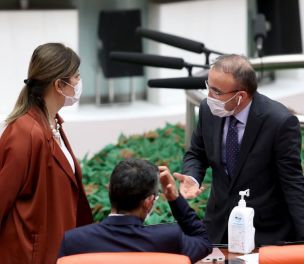Click to read the article in Turkish
Legists have released a joint statement and declared that the Law on Criminal Enforcement passed by the Grand National Assembly of Turkey (TBMM) violates the Constitution on the principles of equality and rule of law and the European Convention on Human Rights (ECtHR).
The statement has been signed by Ali Güzel (retired member of the Constitutional Court); Prof. Cem Eroğul; Prof. Ergun Özbudun; Dr. Kerem Altıparmak; Prof. Köksal Bayraktar; Prof. Oktay Uygun; Prof. Osman Can; Prof. Ozan Erözden; Dr. Rıza Türmen (former member of the European Court of Human Rights); Prof. Rona Aybay; Prof. Yaman Akdeniz.
'This legislation does not seek equality'
The statement has made a call to the Constitutional Court, which has been examining the objection raised against the law:
"The amnesty debates, introduced to the agenda by the ruling parties by employing a discourse of evacuating prisons due to health concerns, were configured by a bill submitted to the parliament (TBMM).
"The bill was formulated according to the ruling parties' demands and programs, legislated as a part of an omnibus law, and entered into force. Demands and objections of the opposition [in the parliament], judges, prosecutors, bar associations, civil society organizations, and expert academics were ignored during the process of both preparation and legislation of this law, leaving the public's legitimate demands and expectations in favor of fostering freedom, security and justice for all individuals unmet and the public conscience wounded.
"In addition to facilitating the prisoners' ability to benefit from parole and conditional discharge options within the penal executory system, this law, which also involves provisional arrangements that amount to issuing a special amnesty law, completely disregards constitutional rights – especially freedom of expression and the right to fair trial – of people, who were subjected to some ambivalent charges of membership of, assistance to and propaganda of terrorist organizations, but were actually tried and imprisoned for expressing their thoughts, taking collective action for freedom, and practicing journalism.
"Moreover, by excluding the detained whose guilt is yet to be established from the scope of this law, no consideration of justice was displayed and the principle of equality was disregarded once more. The provisional Art. 9/5, again excluding the detained from the releases that may continue until the end of the year, enhances the law's 'inadequate' and unequal character.
"This legislation does not seek equality in executing penalties. Between two prisoners with the same sentence, while one can benefit from a conditional discharge or parole and be released, the prisoner in a different category will complete the full penalty, due to the differences in their crimes. This violates the Constitution's Art.10 on the equality principle, Art. 2 on the rule of law, and Art.14 of the European Convention on Human Rights.
'Equalit and rule of law still binding in Turkey'
"Those in power (the majority of the parliament) can, of course, make changes in the penal execution regime or rule on matters related to crime and punishment; and, in exceptional situations, they can issue an amnesty with the support of the 3/5 majority. However, these have limits and cannot be pursued by ignoring the norms of justice, negating the equality principle, and damaging the core of fundamental rights and freedoms.
"The law has to be predictable and comprehensible; it should seek 'public' interest – which means the common good of all individuals, who, with all their differences, are valued, equal in freedoms, and members of the Nation that is the source of sovereignty – not the interest of only one group, one viewpoint, or one class.
"Although this law includes provisions that entail special amnesty, it was legislated by flouting the requirement of a qualified majority. Despite the claim that the arrangements were made as a response to Covid-19 pandemic, through discrimination based on the type of crime and overlooking the right to health, which is directly connected to the right to life, the grounds were prepared for the violation of the core of the right to life.
"The easing of penalties and special amnesty were introduced as a political preference and an act of kindness. However, all acts of political opposition, without any consideration of their employment of any violence, were kept beyond the scope of the law. Thus, public interest has not been pursued, and the equality principle has been breached without a legitimate reason.
"The state's authority to declare an amnesty that is fair and based on the principle of social justice requires assigning priority to the amnesty and easements of penalties for the crimes committed against the corporate personhood of the state; however, by going in the opposite direction, the recent act was turned into an opportunity for discrimination in benevolence, exclusion, and criminalization of political opposition.
"We believe this approach will deepen the political cleavages in our country and damage social peace - our greatest need these days. We would like to remind that despite everything, equality, rule of law and human rights principles of Constitution are still binding in Turkey, which is a constitutional state, and these principles are also constituents of social peace.
"We believe the Constitutional Court will correct these mistakes within the framework of its oversight power and possible interpretations in favor of freedoms. We would like to stress, once again, the vital importance of political pluralism, constitutional principles, law and justice by reminding the lessons of our 100-year-old history." (AS/SD)












